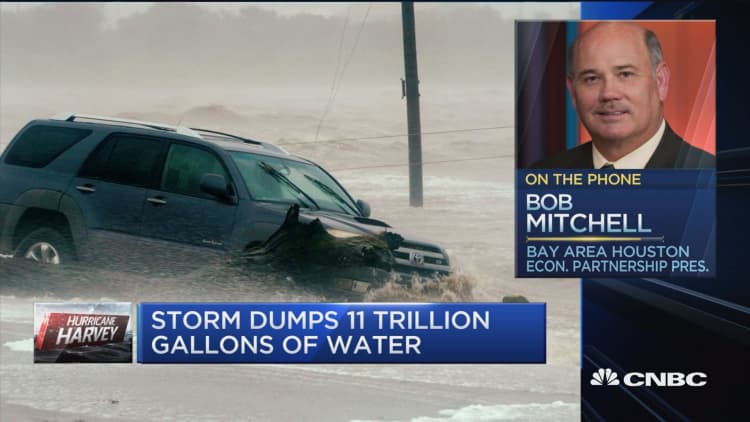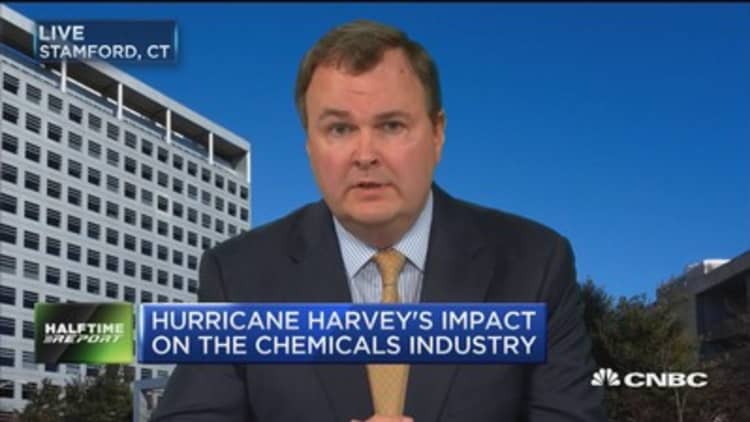Many of the plastics and specialty chemicals that factories across the United States depend on are stuck on the Gulf Coast in the wake of Hurricane Harvey, threatening to create supply shortages and raise prices for U.S. manufacturers.
The U.S. Gulf Coast is home to about 90 percent of the nation's capacity to turn out base plastics, the building blocks for a wide range of consumer and industrial goods. Petrochemical plants that make the products and the rail companies that ship them are still restoring service after Harvey brought devastating flooding to southeast Texas.
"The supply channel is paralyzed currently," said Kathy Hall, executive editor at PetroChem Wire, an industry information service. "Plants are coming back, but we're not seeing anything moving out of the area."
About 60 percent of U.S. capacity to make the most widely used inputs, ethylene and propylene, remains offline, analysts say. These two products play the role in the petrochemicals industry that crude oil, the feedstock for gasoline and diesel, plays in the refining industry.
"You can't make very much without them," Hall said.
So far, the industry hasn't seen shortages and price spikes because factories are burning through their inventory of plastics like polyethylene, which come in small pellets.
But manufacturers do not typically keep huge stockpiles, and they could start running out of those inventories as soon as next week, analysts say.
"If we get into the middle of September and we're not back up and running and producing various plastics, even at some minimal sustainable rate, you're going to start being concerned about the overall supply chain," said Mark Eramo, vice president of global chemical business development at IHS Markit.
Oil refineries and petrochemical plants are coming back online slowly because operators have to conduct inspections and restart the sophisticated equipment in phases to prevent damage. These plants, called crackers, heat oil and natural gas byproducts in order to break them down — or "crack" them — and turn them into base chemicals.
"I liken it to a jet," Eramo said. "Your most difficult times are takeoff and landing. Once you're gunning at cruise control, you're good to go."

The slow process is preventing petrochemical factories from bringing in feedstocks like ethane and propane, according to PetroChem Wire's Hall. At the other end of the factory, storage tanks of finished products are full because rail access remains limited.
On Wednesday, rail companies were still restoring service to parts of southern Texas. Union Pacific, Kansas City Southern and BNSF reported challenges restoring service to the Beaumont, Texas, area and parts of Houston, which saw heavy flooding.
The outages forced Union Pacific to reroute traffic through Pine Bluff, Arkansas, while Kansas City Southern trains were operating at just 10 mph on a stretch out of Houston.
BNSF rail service map
If shortages develop and prices spike, consumers likely won't see much impact at store shelves, according to Eramo. That's because big retail chains like Wal-Mart that wield considerable power over manufacturers insulate shoppers against rising prices.
Instead, plastic manufacturers and petrochemical companies will likely absorb those cost increases. The impact may not show up until companies report third-quarter earnings.
Investors got a preview on Wednesday when Newell Brands lowered its earnings guidance for 2017 due to supply chain disruptions from Harvey. The maker of Rubbermaid storage products and other consumer goods cited the higher cost of sourcing resins from alternative suppliers at home and overseas.
"We expect these conditions to persist through the fourth quarter of 2017 and resin inflation to now build, rather than contract as previously forecast, through the balance of 2017 and into 2018," Newell CEO Michael Polk said in a statement.
Big plastics manufacturers can turn to overseas markets to fill some, but not all of the gap left by Gulf Coast petrochemical plants, according to Eramo.

Some manufacturers may be protected from shortages, according to Joseph Sevick, research director at energy research firm Wood Mackenzie. Data collected by Wood Mackenzie show some factories purchased large inventories that would carry them through the fourth quarter, when the market expected prices to fall as three new major petrochemical facilities came online.
Whether those plants will open on time is a big question in the wake of Harvey, said Sevick. He notes that record rainfall fell in Baytown, Texas, where Chevron Phillips Chemical expects to open a new ethane cracker in the fourth quarter.
Delays at any of the facilities could be a silver lining for the industry as a whole. Petrochemical plants have been reaping healthy profits, but a new slug of supply from the new plants would cut costs and eat into margins.
"If those things are delayed further on, these excellent margins will last longer than people expected," Sevick said.


